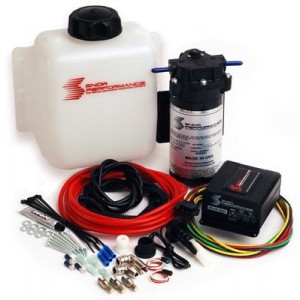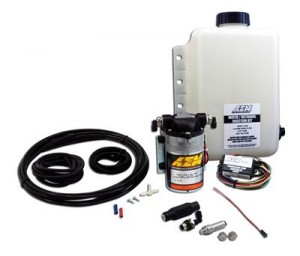What Is A Water Methanol Injection System
Water/methanol injection is nothing new. Like nitrous oxide and superchargers, it has been used as far back as World War II to help power German fighter planes. Yet it never seemed to catch on as a mainstream power adder in the hot rodding world—until now.
Companies like Snow Performance and AEM are now offering easy to install water/methanol injections systems for affordable prices—starting at around 300 bucks. Available for naturally aspirated or forced induction gasoline and diesel applications, these systems inject a roughly 50/50 mixture of methanol and water into the engine using a high-pressure pump. This magical mixture allows for more ignition timing, increases boost capability in supercharged or turbocharged applications, lowers air intake temperature, and provides an additional source of very high-octane fuel—all without increasing the chance of damaging detonation.

Water/Methanol Injection System from Snow Performance
Water/Methanol Injection: How it Works
The secret to water/methanol injection lies in its key ingredients. Methanol is a high octane fuel that is also extremely resistant to detonation. It has a tendency to absorb heat out of the air—something known as "latent heat of vaporization." The water also absorbs heat and provides a further cooling effect as the finely atomized water/methanol mix is pumped into the engine. The cooler, denser intake charge reduces the chances of detonation even as the high-octane methanol boosts power.
Still not sure about water/methanol injection? With the help of our manufacturers, we've put together a list of FAQs to help you determine whether water/methanol injection is right for you.
Water/Methanol FAQs
What are the benefits of water/methanol injection?
1. More power: the high-octane properties of methanol, along with air cooling properties of the methanol and water, help water/methanol systems produce more power. In addition, the cooler intake temperatures allow you to run more aggressive timing and/or boost (forced induction applications) without increasing the chance of detonation.
2. Reduced chance of detonation: the lower intake charge temperatures created by the methanol and water mean less chance for engine-damaging detonation.
3. Relatively low cost: water/methanol systems start under $400.
4. More economical for the street: water/methanol is a less expensive high-octane alternative to pure race gas for guys running high compression engines on the street.
5. Built-in engine maintenance: in some cases, the atomized water effectively steam cleans the valves, valve seats, and even the piston tops and intake, reducing carbon buildup.
Why is methanol used?
Methanol is a very high-octane fuel that is extremely resistant to detonation. Its high latent heat of vaporization also makes it an excellent air charge cooler which means a denser mixture and more horsepower. Because of these characteristics, it suppresses detonation more effectively than ethanol or iso-propanol.
What type of power gains can I expect?
Depending on the system, timing can often be advanced 10 degrees or more when a water/methanol system is used. Boost can often be increased five or more psi. When combined with the cooler air intake charge created by the water and methanol, these changes can net a horsepower increase of up to 20 percent in power-adder applications. In naturally aspirated applications, horsepower gains of 5-10 percent are possible.

Water/Methanol Injection System from AEM
Do these systems work on naturally aspirated engines?
Snow Performance makes a water/methanol injection system for carbureted and fuel injected naturally-aspirated applications. With stock compression engines (10:1 compression or less), Snow Performance says you gain up to 15 horsepower with full timing and achieve more effective air/fuel ratios and increase gas mileage. In naturally aspirated high compression engines, Snow Performance's water/methanol injection system allows the use of pump fuel in most situations, making it a more budget-friendly alternative to race gas. Plus, the colder, denser intake charge delivers more horsepower and allows for higher timing advances.
Can a water/methanol system improve my fuel economy?
Yes. The higher-octane methanol allows for more spark timing advance and a leaner air/fuel ratio with the use of a programmer. Additionally, most modern cars will detect the combustion of the methanol and reduce the injection of gasoline. This can positively impact gasoline fuel economy.
Where can I purchase Methanol?
Methanol can generally be purchased where racing fuels are sold. It is important to make sure that the methanol is "neat" and therefore has no additives or lubricants added by the supplier.
What ratio of water/methanol is recommended?
A 50/50 ratio is recommended, although ratios of anywhere from 30 percent to 50 percent methanol work well and deliver excellent octane gains and cooling. The 50/50 ratio has been demonstrated to be the best for charge/air cooling, excellent detonation control, and safety. It should be noted that methanol is easy to ignite and burns with a nearly invisible flame. For that reason, any ratio that far exceeds the recommended 50/50 ratio can be hazardous.
Do I need an intercooler when I use water/methanol injection with another power adder?
50/50 water/methanol will provide all the density increase/detonation control needed to handle up to 30 psig of boost. However, an intercooler and water/methanol injection together would provide even greater benefits, especially beyond 30 psig of boost.
How long will a tank of water/methanol last?
This depends on a few variables—horsepower, injection system, settings, and driving style. However, Snow Performance says its three-quart tank will typically last around a tank of gasoline in most engines in the 200-500 horsepower range. Most systems, including those from Snow Performance and AEM, include some sort of fail-safe device that reduces boost or adjusts timing curves in case the flow of water/methanol is exhausted or suddenly drops.
Author: David Fuller David Fuller is OnAllCylinders' managing editor. During his 20-year career in the auto industry, he has covered a variety of races, shows, and industry events and has authored articles for multiple magazines. He has also partnered with mainstream and trade publications on a wide range of editorial projects. In 2012, he helped establish OnAllCylinders, where he enjoys covering all facets of hot rodding and racing.
What Is A Water Methanol Injection System
Source: https://www.onallcylinders.com/2012/02/02/watermethanol-injection-101-frequently-asked-questions/

0 komentar:
Posting Komentar